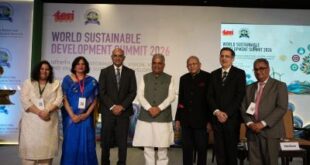The programme is strategically designed to bridge the gap between clinical and business skills, empowering professionals with visionary
leadership to transform India’s healthcare landscape
Mumbai, August 08, 2024: With
the Indian healthcare market projected to reach US$ 320 billion by 2028, growing at 12% CAGR, as per Bain & Company, the healthcare industry is poised for significant growth and innovation, driven by advances in technology, shifting patient needs, and evolving
healthcare management practices. Healthcare organisations need leaders who possess a comprehensive understanding of the industry from a management perspective, including financial, operational, marketing, and strategic aspects. Acknowledging this increasing
demand, ISB Executive Education, the #1 B-School in India as per FT Global MBA Ranking 2024, has announced the launch
of its ‘Certificate
Programme in Healthcare Management’
along with Emeritus, the global leader in making high-quality education accessible and affordable to individuals and organisations and
the Max Institute of Healthcare Management.
The 12-week high-impact online programme is designed for healthcare professionals aiming to transition to team leader or administrative roles, including
doctors, pharmacists, and para-medical staff seeking management skills. It is particularly well-suited for mid-level healthcare administrative professionals
seeking to advance their managerial acumen and enhance healthcare delivery within their institutions.
Additionally, it is also beneficial for medical professionals planning to start their own clinics, hospitals, or businesses in the healthcare
sector.
Announcing the programme’s launch,
Mr. Mohan Kannegal, CEO, India and APAC, Emeritus, said, “Healthcare organisations are increasingly recognising the need for skilled
management to navigate the evolving landscape and enhance service delivery.
The Certificate Programme in Healthcare Management equips professionals with key skills in financial oversight and strategic planning.
By bridging the gap between clinical expertise and strategic leadership, it empowers participants to lead healthcare organisations
more effectively and drive innovation. As the industry adapts to emerging trends such as AI and quality management, this programme ensures that healthcare leaders are well-prepared to meet future challenges and advance their organisations.”
According to the Healthcare Industry Report by India Brand Equity Foundation,
the demand for Indian healthcare professionals is expected to double nationally and globally by 2030 due to a shortage of healthcare workers in India. As healthcare organisations revamp their management structures to expand access to quality care, they are
seeking trained and skilled managers to lead this transformation. The Certificate Programme in Healthcare Management by ISB Executive Education is specifically designed to bridge this gap, equipping healthcare professionals with the advanced knowledge, skills,
and expertise required to navigate the complex healthcare ecosystem. By combining cutting-edge research, industry insights, and experiential learning, this programme is aimed at fostering a new generation of healthcare leaders.
Through this programme, participants will be able to:
·
Learn how to optimise healthcare organisation’s finances to achieve sustainability and business objectives
·
Understand the process of strategic outreach and develop marketing strategies to attract, guide, and engage healthcare consumers
·
Gain a holistic overview into the accounting and capital management processes of the healthcare industry
·
Apply operational frameworks through real-life examples for practical learning
·
Supervise daily practices that involve client experience and organisational goals in healthcare facilities
 Newspatrolling.com News cum Content Syndication Portal Online
Newspatrolling.com News cum Content Syndication Portal Online






